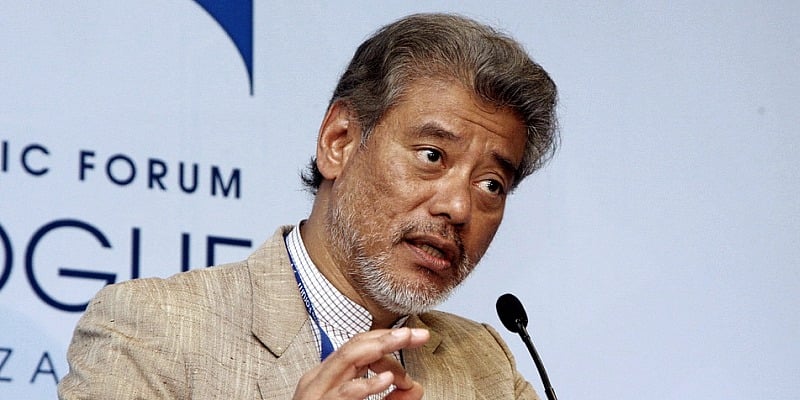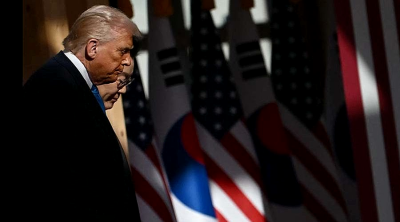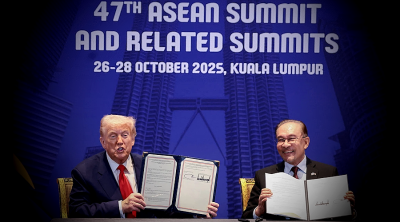
US President Donald Trump has again seized global attention by arbitrarily imposing sweeping tariffs on the rest of the world.
He reminds us America is still boss, claiming to ‘make America great again’ (MAGA) by ensuring ‘America first’ at everyone else’s expense.
Liberation Day?
is April 2 Liberation Day announcement triggered wild speculation over his proposal’s final form, implications, significance, and likely impacts, not only for the near future but also well beyond.
Since then, the world has been scrambling to understand better the president’s intentions to protect their interests.
This has also triggered much talk about managing adjustment and enhancing resilience.
Shocked by his unilateral abandonment of the revised free trade agreement renegotiated during Trump 1.0, its North American neighbors were the first to engage publicly.
More recently, China’s ironically reciprocal response gave Trump another excuse for more punitively escalating his ‘reciprocal tariffs’.
With little left to lose even before Trump’s latest tariffs against China, it said No to the Orange Emperor, switching the impact from manufacturing to agriculture.
Only major economies dare to retaliate. However, due to its geopolitics, including Trump’s demands for more ‘equitable’ NATO cost-sharing, an appropriately strong European response seems unlikely.
Many prioritize the Western alliance, while a few prefer other options. Sensing the ‘silence of the lambs’, the president has gloated over the steady stream of foreign leaders coming to ‘kiss my arse’.
Trump’s tariff fetish
The tariff announcement was not set in stone. It remains to be seen how much Trump’s support base, especially from the US corporate elite, will succeed in revising his measures.
He is unlikely to respond positively to opposition from abroad or even within the US. The tariffs will be tied up in legal and legislative procedures for some time, even after they go into effect.
The dissent of some Senate Republicans suggests the US Congress may reject the tariffs as a significant infringement on their Constitutional prerogatives.
Announced as executive orders, they are subject to judicial scrutiny. Of course, the White House will have to reconsider which battles to fight and which to concede without appearing to do so.
A face-saving compromise between the Republican-controlled Congress and the White House is increasingly likely. Attention can thus be diverted abroad to preferred targets such as China and Iran.
Some other countries, especially the BRICS, may also be hit to ‘save face’. The president can then claim he tried his best to MAGA but was foiled by foreign-connected opponents.
While Trump critics are making much of his subsequent revisions, concessions, amendments and postponements, the greater significance of his announcement lies elsewhere.
Divided we fall
Trump 2.0 will dictate the terms of US engagement with the world. He has already reminded everyone he is The Great Disruptor. Dismissing cooperation as for losers, his team’s purpose is to put others down.
Trump has subverted the World Trade Organization and all US-negotiated trade agreements except when it best serves its interests. He has given notice of selectively invoking multilateralism and the rule of law to serve his preferred interests best.
Although all European countries will be affected by Trump’s tariffs, each will be hit differently. Hence, developing a strong, unified European position will be difficult. This will deter other regional and plurilateral groupings from collective action.
In one stroke, Trump reminded the world that America remains number one and that he means business. Critics overlook his purpose and strategy by dismissing his methods and tactics as transactional, stupid or irrational.
Method to the madness?
Trump’s Council of Economic Advisors chairman, Stephen Miran, has offered an economic rationale for Trumponomics 2.0.
He argues the world must pay for the ‘global public goods’ the US ostensibly provides, especially US military spending.
He also insists the US is doing the world a favor by allowing the US dollar to serve as the world’s reserve currency. He ignores how it earns seigniorage and the ‘exorbitant privilege’ of being able to issue debt to the rest of the world without having to repay.
His so-called Mar-a-Lago Accord purports to offer more financial stability through US dollar currency pegs and related digital currency arrangements, requiring payment flows to the US Treasury and Federal Reserve.
Trump has promised even more regressive tax reforms for the super-rich who generously funded his re-election campaign. As before, this will be obscured by some tax relief for the ‘middle class’.
The shift from potentially progressive direct taxation to more indirect taxation has already begun, with the proposed tariffs impacting purchases of merchandise imports.
Industrial policy redux?
Tariffs cannot simply restart long-abandoned production overnight. Earlier manufacturing jobs were lost to imports and the automation of production processes.
Reviving abandoned productive capacities and capabilities will mainly create poor jobs. ‘Fortress USA will attract some investments, mainly for the limited US market, but it cannot transform itself into the world’s manufacturing powerhouse it once was.
Recent reshoring efforts have proved embarrassingly unsuccessful. This has been evident with the difficulties of the forced relocation of the world’s leading (Taiwanese) semiconductor manufacturer to the US.
Trump’s turn to industrial policy is more backward-looking than progressive. It seeks to save uncompetitive old capacities rather than advance potentially competitive new investments, technology, productive capacities, and capabilities.
Also, investment and technology promotion need supportive policies, especially in human resources, research, and development, which are increasingly undermined by Musk-led government spending cuts.
Related IPS articles:
- America first deepens world stagnation
- Imperialism (still) rules
- An ‘exorbitant privilege’ for all?
- New geopolitics worse for Global South
- Western finance ruining economies of the rest
- The Global South in the New Cold War
- Global poverty grows as super-rich get richer faster
(Jomo Kwame Sundaram is currently senior adviser at Khazanah Research Institute (KRI). A former economics professor, he was United Nations assistant secretary-general for economic development. He is a recipient of the Wassily Leontief Prize for Advancing the Frontiers of Economic Thought.)
ADVERTISEMENT
ADVERTISEMENT








































